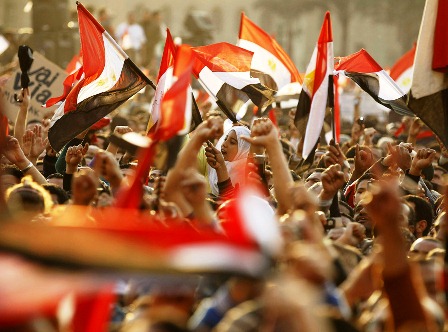
Right click on download and select ‘Save Target As…’ to download the full book.
Introduction
For the Muslim World, 2011 will remain long in the memory when the history books are finally written. What began with a single man in the markets of Tunisia spread to thousands on the streets in Cairo and evolved to hundreds of thousands demanding political change for the entire region. The self immolation of Mohamed Bouazizi in Tunisia created a sweeping wave, which crossed the artificial border to Egypt, then to Libya, Yemen and Bahrain until it engulfed most of the Muslim world. The Arab spring has seen many brave the streets to protest and change the status quo which has dominated the political, economic and social landscape for so long. The reaction of the Muslim rulers was as predictable as it was brutal with violent clampdowns leaving thousands dead and many more injured.
The nations of the Muslim world won their so called independence a long time ago, but they became corrupt dictatorships, neglected their peoples and became ruthless political tools of western governments. The Muslim lands became characterised with rulers who remain in power for life and remain above the law. Their cronies are beyond approach, leading to corruption. Elections at most are farcical – when they take place, whilst holding any ruler to account is non-existent. Most rulers have tactics that make the KGB look soft in maintaining societal cohesion.
Today, under the plethora of secular models, the people of the Muslim World have no political rights, endure crippling living standards due to high prices and even higher taxes, and have zero international influence. Yet despite this tragedy, some in the Muslim World, backed by their supporters in the West, believe that a reformation of a secular constitutional order, the imposition of western friendly leaders and a continued commitment to the same foreign policy that has long marginalised the Muslim world is the way to proceed. This approach is not only delusional, but if left unchecked will lead to further eventual disintegration of the Muslim World.
The Western constructed architecture of supporting, funding, arming and defending dictator rulers is now falling apart, this space is now the new battle ground. For decades, the despots of the Muslim world have pursued a set of narrow interests which have sidelined their own people: securing the free flow of commerce for the west, fighting against the Islamic revival and standing up for Israel’s security at the expense of the Palestinians. Yet now, after decades of despotic rule and western interference, the political situation is in flux.
For the moment Libya is the only country that has experienced regime change, some of the other countries have only had a change in leadership, whilst the regimes remain in place. Western governments and their media have branded the call for change in the region as a call for democracy and Western values of freedom and secularism. Some in the Muslim world have called for Western aid and intervention, in the hope that change comes to the region, not understanding the Western agenda.
The Muslims of the Arab world face a real dilemma. The Arab world has not experienced the true face of democracy, freedom and secularism, unlike the subcontinent where Democracy has brought corrupt politicians loyal to the West to power. It is with this in mind we look at the dilemmas the Ummah faces in the Arab Spring.
The challenges in forming a new politics which creates an accountable government, allows the people to elect their rulers, have independent judiciaries, rights for citizens and an end to the police state.
Despite possessing abundant mineral and capital wealth only the ruling elites have prospered from the Ummah’s resources. The Muslim world needs a new economics and not more of the same failed policies designed in Western capitals. We will look at how economic development, job creation, economic growth, wealth distribution all rooted in Islam can replace poverty, unemployment and underdevelopment.
The Arab spring has seen men, women, old, young, Christian, Muslim, labourers and professionals take to the streets to remove their rulers. The West with their experience in nation building in Iraq and Afghanistan insist that the rights of women, minorities, sects and religion are best preserved by secularism. We assess secularisms track record and look at what Islam – something indigenous to the region has to offer.
The West has for long viewed the Muslim world as territory to be used for furthering its interests. The West has cultivated individuals, political parties and made contact with elites who ensured that an Islamic revival was always stopped in its tracks. We look at the real face of Western foreign policy and what democracy, human rights and self determination really mean. We also evaluate how the Muslim world can break free from foreign interference, reunify with the wider Muslim world and become truly independent.
The reference to capitalism in this book is to the system of governance, free markets and freedoms that have evolved in the West. Whilst many may refer to capitalism when only looking at the economy in the West which is usually characterized by free markets and deregulation, in this book liberalism, democracy, freedom and secularism is used synonymously with Capitalism. The views also expressed in this book are those of the author
Adnan Khan
10 Dhu al-Qi’dah 1432
7 October 2011
